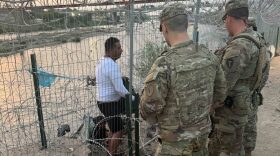The Bhutanese are by far the largest group of refugees in New Hampshire. Since 2008 the US has resettled almost 800 men, women and children in Concord, Manchester, and Laconia
Before then, many Bhutanese lived for nearly two decades in camps in Nepal.
As part of our series on immigration, we will follow one Bhutanese family as they spend their first year in the Granite State.
Keith Shields has our first installment.
(sound)
Allow me to introduce you to the Darji Family. There’s Rom who’s 23, his 21 year old wife Saraswarti and their one year old daughter Angel.
(Sound)
Since July, the Darjis have lived in an apartment complex in Concord with Rom’s mother.
They grew up in refugee camps.
They lived in flimsy bamboo huts. There were times when they had little to no food. And Saraswarti and Rom say, conditions at the camp so dirty, that it made people ill.
(Saraswarti) "There is too dirty, and people are too sick." (Rom) "Yeah, most of camp was dirty. But one thing is that we could not get authorize to work out of the refugee camp and that is also painful to us."
To understand how over one hundred thousand Bhutanese ended up in refugee camps, you have to go back pretty far, to 1616. That’s when the kingdom of Bhutan was established.
Soon after, and for centuries after that, men and women from the nearby country of Nepal were allowed into the country. They built roads and schools, worked on the Bhutanese tea plantations and eventually gained citizenship.
But in the 80’s things began to change. The government established a One Nation, One People policy. The Nepalese speaking Hindus were told to practice the Buddhist customs and beliefs of the government. Bhagirath Khatiwada is with New Hampshire’s Bhutanese Community Association. He was in the same refugee camp as Rom Darjee.
"People were forced to speak the language that is being spoken by the ruling class. People were asked to follow the culture that is being practice by the ruling class which other ethnic groups did not like."
Soon after a census was started; anyone who couldn’t provide tax documents to prove they were citizens as far back as 1958, was asked to leave the country.
Most didn’t leave, and so tougher methods of intimidation were used.
"Armies were deployed in the villages, they started terrorizing people physically. They beat someone in public so that other people would fear that ‘oh that thing would be happening to me as well”. We left everything, left our domestic animals, we left whatever we had, we were not allowed to take anything else, just ourselves."
Tens of thousands ethnic Bhutanese wound up in refugee camps in Nepal, where, as Rom recalls, treatment from surrounding villagers could be harsh.
"Sometimes when refugee person work in the village, then the local people kidnap them and they beaten them."
For nearly two decades, the United Nations tried to get the Kingdom of Bhutan to allow the Nepalese to return. Finally in 2008, they gave up. Many of the Bhutanese refugees living in Nepal would be resettled to the United States and six other countries. That year, 154 came to New Hampshire.
Every year since, several hundred have arrived.
Bhagirath Khatiwada now works with many of the newcomers.
"In terms of resettlement, language is the biggest requirement for people to be integrating successfully and easily. Next one is driving skills. These folks had never an opportunity to drive a car back in country. And then, finding a job."
(sound)
In those respects the Darjees have integrated fairly well in the four months since they arrived in New Hampshire.
They now have a home and carpet under their feet for the first time.
They use appliances that they had no idea existed only a year ago.
Rom already has his driver’s license and a car. And he uses that car to drive himself and his brother in law to their jobs in Haverhill, Massachusetts.
They know they’re lucky in so many ways.
Many more Bhutanese still live in the camps, including some of Rom’s family.
"We think we are the lucky guys to be as a refugee, and sometime we feel lots of happiness and sometimes we feel also sadness that we had the no future before... our life is like the insect in the different section of Nepal and Bhutan. KEITH –When you say an insect, you sort of mean small right?, Yeah, you felt small living in the refugee camp. The refugee is like an insect because insect nobody wants. Nobody wants the insect to be at the home."
So for Rom and his family, the biggest gift, by far, more than new appliances and a new job, is they can, for the first time in their lives, feel a part of a country.
"But now we are not an insect, because some organization, pick up us up from the pit. Now we are not the insect, we are the human being, because now we have the right, we have the freedom. We can work, we can do the right thing for the nation."
The Darjees are on the right track, but many challenges lie ahead, mostly economic. Their refugee benefits have largely run out, they have rent to pay, a young baby to care for and they must repay an expensive plane ticket that brought them to New Hampshire. In our next installment, we’ll look at how the Darjees pay the bills.
For New Hampshire Public Radio, I’m Keith Shields








